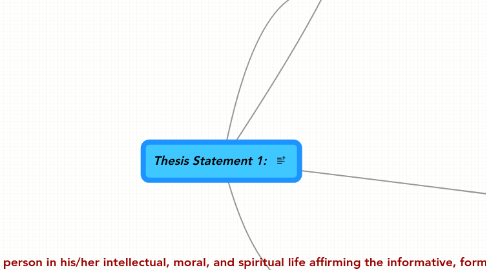
1. 3. It addresses the whole person in his/her intellectual, moral, and spiritual life affirming the informative, formative, and transformative goal of theological education.
1.1. Its key components are
1.1.1. a sacramental view of life in the world
1.1.1.1. God is present in all things, all human activity is imbued with a sense of meaning and purpose
1.1.2. A commitment to developing in the students a taste for the other (a recognition that God intends them to be responsible as a community)
1.1.2.1. essential ingredient of Jesuit education: sense of justice
1.1.3. Priority of the notion of service in the doing of God's will
1.1.3.1. "Giving oneself over" -- Ignatius
1.1.3.2. our mission is to give oneself in service to God's redemptive plan
1.1.4. Commitment to the education of leaders
1.1.4.1. they will occupy positions of power and influence in the world in all walks of life
1.1.4.2. everyday action in the world of the life of faith finds concrete expression
1.1.5. Priority on the importance of the interior life or the inner journey of faith
1.1.5.1. enable individuals to explore and frow in their understanding of how God is present in their lives, and of how they might come to know God in a deeper way through a reflection on their own personal experiences, and of how to make choices in light of God's presence
1.2. faith: not just something to think about, but something to think with
1.2.1. not just an activity but a grammar/rubric that guides and structures our thought processes
1.2.2. necessarily involves the whole of our being, intellectual and spiritual
1.2.3. faith guides our reasoning, and our reasoning gives intelligibility to faith.
2. 4. Theological education for thinking faith is imperative in the times we live in.
2.1. One crisis: Careerism
2.1.1. symptoms
2.1.1.1. excessive demand to succeed
2.1.1.2. desire driven by fear and anxiety of failure
2.1.1.3. strains to establish certainty and security in a wold that seems to provide little of either
2.1.2. premature commitment to an identity
2.1.2.1. identity: an integral unity of one's gifts, potential roles, and image of the self and the capacity to be faithful to the choices and direction that one has freely chosen without risking the losing of the self
2.2. A matter of faith is at stake, not just a practical matter
2.2.1. New node
2.3. involves
2.3.1. the intellectual and informative
2.3.1.1. theology is a critical discipline
2.3.1.1.1. tasked to distinguish official expressions of church's faith from popular belief and theological opinion
2.3.1.1.2. discern between meaning that lasts and meaning in the context of an artificial moment
2.3.1.1.3. an activity with theology as grammar, dealing with the way the heart reasons abotu everything
2.3.2. the moral and formative
2.3.2.1. concerned with articulating the values that inform Christian life
2.3.2.2. personal and social theology of ethics
2.3.3. the spiritual and transformative
2.3.3.1. Concerned with Christian spirituality
2.3.3.1.1. spirituality: living a certain way
2.3.3.1.2. attempt to give an orientation to the whole of one's daily living under the influence of the spirit of Christ and the Gospel
3. 1. Theology is at the core of Jesuit Education.
3.1. One of the primary goals of Jesuit education is to instill in the students of our universities the skills and abilities to respond in their own unique ways to God's call to them for the realization of their own authenticity.
3.2. What is theological education?
3.2.1. Wisdom proper to the life of the believer
3.2.2. participation in an inquiry into the truth and substance of all things in the context of the present reality of God
3.2.3. A direct engagement with the resources needed for a thinking faith
3.3. Jesuit education is most itself when it asks "God Questions", the larger context of your choices & plans, asking yourself where God fits in the bigger picture, or perhaps where I fit in God's bigger picture.
4. 2. It is the critical/intelligent reflection on the meaning of our human (personal/communal) experiences in the light of God's revelation
4.1. Discernment
4.1.1. a way of enabling individuals and communities to make choices in the present in light of the past choices that promotes human and spiritual growth in the future
4.1.2. Leads to an understanding of the direction and path that one is to follow to be faithful to God's purposes and intentions
4.1.3. Centers on the process of detecting God's movements & presence of responding to God's call in action.
4.1.4. A process of decision-making in which the person has several alternative choices. He determines which of these choices is God's will through a reflection of stirrings or movements or responses which a person subjectively experiences vis a vis the possible alternatives.
